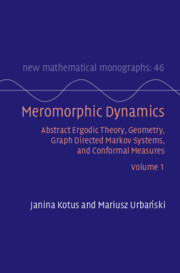 Meromorphic Dynamics
Meromorphic Dynamics Book contents
- Frontmatter
- Dedication
- Contents
- Contents of Volume II
- Preface
- Acknowledgments
- Introduction
- Part I Ergodic Theory and Geometric Measures
- 1 Geometric Measure Theory
- 2 Invariant Measures: Finite and Infinite
- 3 Probability (Finite) Invariant Measures: Basic Properties and Existence
- 4 Probability (Finite) Invariant Measures: Finer Properties
- 5 Infinite Invariant Measures: Finer Properties
- 6 Measure-Theoretic Entropy
- 7 Thermodynamic Formalism
- Part II Complex Analysis, Conformal Measures, and Graph Directed Markov Systems
- References
- Index of Symbols
- Subject Index
1 - Geometric Measure Theory
from Part I - Ergodic Theory and Geometric Measures
Published online by Cambridge University Press: 20 April 2023
- Frontmatter
- Dedication
- Contents
- Contents of Volume II
- Preface
- Acknowledgments
- Introduction
- Part I Ergodic Theory and Geometric Measures
- 1 Geometric Measure Theory
- 2 Invariant Measures: Finite and Infinite
- 3 Probability (Finite) Invariant Measures: Basic Properties and Existence
- 4 Probability (Finite) Invariant Measures: Finer Properties
- 5 Infinite Invariant Measures: Finer Properties
- 6 Measure-Theoretic Entropy
- 7 Thermodynamic Formalism
- Part II Complex Analysis, Conformal Measures, and Graph Directed Markov Systems
- References
- Index of Symbols
- Subject Index
Summary
We start with quasi-invariant measures and early on, in the second section of this chapter, we introduce the powerful concept of the first return map. This concept, along with the concept of nice sets, forms our most fundamental tool in Part IV of our book, which is devoted to presenting a refined ergodic theory of elliptic functions. We introduce, in this chapter, the notions of ergodicity and conservativity (always satisfied for finite invariant measures), and prove the Poincaré Recurrence Theorem, Birkhoff Ergodic Theorem, and Hopf Ergodic Theorem, the last pertaining to infinite measures. We also provide a powerful, though perhaps somewhat neglected by the ergodic community, tool for proving the existence of invariant s-finite measures absolutely continuous with respect to given quasi-invariant measures.
- Type
- Chapter
- Information
- Meromorphic DynamicsAbstract Ergodic Theory, Geometry, Graph Directed Markov Systems, and Conformal Measures, pp. 3 - 54Publisher: Cambridge University PressPrint publication year: 2023
